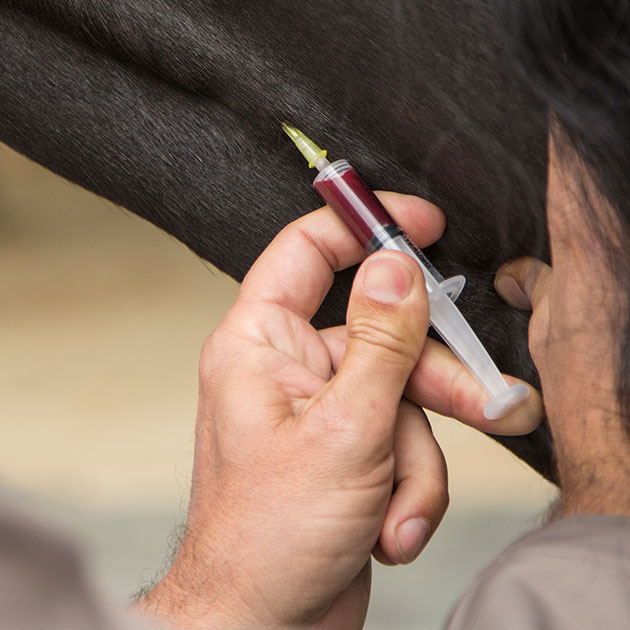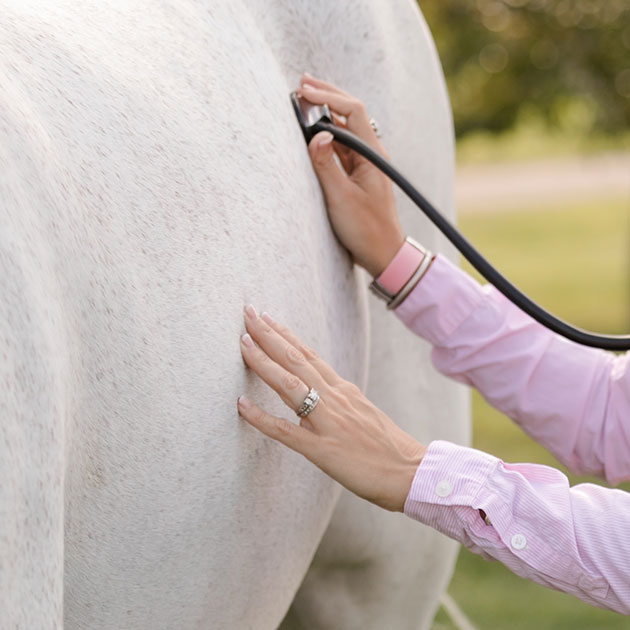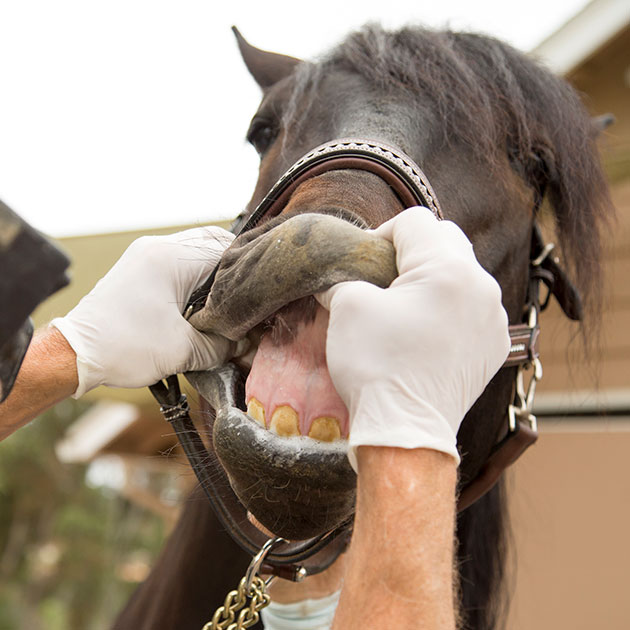Routine Wellness Minimizes Health Care Costs by Catching Smaller Issues Before They Become Major Health Concerns for Your Horse
Medical folklore prescribes “an ounce of prevention to be worth a pound of cure.” A contemporary way to say this might be that it is worth focusing on and maintaining a well horse rather than addressing health issues as they arise. Wellness is a healthy horse, and we sustain it with proactive care.
In equine medicine, routine wellness exams are suggested for all horses with the purpose of both maintaining good health and preventing issues before they become significant problems. Many veterinary practices offer wellness packages with annual or biannual “checkup” exams for adult horses in the spring and/or fall. Horses under 1 year of age and senior horses may need to be seen more frequently. This is an opportunity for veterinarians to take an objective assessment of general health. Matt Durham, DVM, DACVSMR, a technical services veterinarian for Platinum Performance®, has over 25 years of clinical experience promoting equine health. He feels strongly about the importance of routine veterinary-directed wellness exams. “One of my favorite sayings is ‘more is missed by not looking than by not knowing.’ Consistent examinations help to put us in the proactive mode instead of being primarily reactive after a problem has already started,” says Dr. Durham. “As a veterinarian, I want to know about problems as soon as possible, so that the appropriate management steps can be taken immediately. If I can prevent a problem, I always prefer that.”
Veterinarians may differ to some extent as to what is included in their basic wellness exams, which depends on age of the horse, travel frequency, activity level or lifestyle. The following are likely to be offered for an equine wellness exam: A physical exam to look at the overall horse, check weight and assess body condition. The vet will check vitals and listen to the heart, lungs and gut sounds. Blood may be collected to run laboratory tests. Wellness exams typically include fecal sampling, deworming and vaccine administration to prevent your horse from contracting several deadly, but preventable, diseases. The horse’s mouth and teeth will be examined. Your vet may offer to do a full dental evaluation as part of the wellness exam but be aware that it will require a mouth speculum and likely sedation. Some vets and/or horse owners opt to do this as a separate visit.
“Consistent examinations help to put us in the proactive mode instead of being primarily reactive after a problem has already started. As a veterinarian, I want to know about problems as soon as possible, so that the appropriate management steps can be taken immediately. If I can prevent a problem, I always prefer that.”
— Matt Durham, DVM, DACVSMR, Platinum Performance®
Medical History
The veterinarian will want to review the horse’s medical history. This is useful information for any vet and especially if he or she is new to your program. Let them know of any previous health issues, including any illnesses, injuries or surgeries and whether the horse is currently taking any medications. Have the dates and types of previous dewormings and vaccinations on hand. Be able to describe the horse’s general lifestyle, including activity level and whether the horse travels or is often exposed to new horses. Don’t forget to mention any significant management changes or deviations in the horse’s appetite, urination/defecation habits or activity level.

Physical Exam
The first part of the physical exam will be to assess the horse’s general appearance and attitude. Veterinarians will look at coat condition, checking from tip to tail for lumps, swelling or skin abnormalities. Approximate weight will be taken usually by using a weight tape, and the horse will be given a body condition score (BCS), which evaluates general condition on a 1 to 9 scale, where 1 is emaciated and 9 is obese. Muscle tone and fat covering of neck, ribs, hips and tailbone are used to determine a numerical score. Vets may have suggestions if the horse is too thin or overweight. Be able to describe the horse’s diet, including pasture time, hay, grain and supplements. Feel free to ask questions.
Vital signs will be checked — temperature, pulse and respiration rate — and the vet will listen to the heart, lungs and digestive tract with a stethoscope. “I really value having a normal baseline for each horse. ‘Normal’ temperature and heart rate, digital pulse quality, bloodwork parameters, and so on, vary from horse to horse. For example, if I found a heart rate of 40 in a horse on a first examination, I would consider it normal. But if I knew that a particular horse consistently had a resting heart rate of 32, I would not consider 40 to be normal for that horse and would want to keep looking,” explains Dr. Durham. “There is really nothing that replaces a good physical examination for picking up on the minor (or major) issues that might lurk under the surface.” Vets will also look at the gums, making sure the color, moistness and capillary refill time of the mucous membranes are within normal ranges. Eyes and ears will be checked for abnormalities. For geldings and stallions, sheaths will be palpated and cleaned as needed.
Veterinarians may want to watch the horse in motion to monitor joint and soft tissue mobility and comfort. “Because horses are athletes, understanding the musculoskeletal condition of each horse is critical,” Dr. Durham says. “This is true for the young horse, the prime elite athlete, the backyard buddy and the geriatric horse. Each horse has specific needs in order to perform at their particular level, and detecting issues with the feet, tendons, joints and so on early can make a world of difference.” Watching the horse’s gait allows for a soundness assessment and can rule out neurologic concerns. It also helps to determine if supplements, medications or injections may be warranted.
Bloodwork
Blood draws are often part of a wellness exam in order to run several laboratory tests. Common blood tests include a complete blood count (CBC) and a chemistry panel. Testing for metabolic issues like Equine Metabolic Syndrome and Cushing’s Disease (PPID), especially in senior horses, or for specific tests like selenium or vitamin E levels may be indicated depending on the circumstances. A CBC is a routine screening for general health and looks at red blood cells, white blood cells and platelets. Red blood cells can change depending on disease state, such as anemia or dehydration. White blood cell counts are often used to detect infection or inflammation. Platelets are needed for blood clotting. A chemistry panel measures several biological values and is used to evaluate organ function, including the liver and kidneys, blood protein levels and electrolyte values. “Ideally, I love to see annual bloodwork,” recommends Dr. Durham. “Kidney disease especially can go undetected for quite a while but typically shows up on bloodwork well before clinical signs start.”
Depending on whether your horse travels, the vet may suggest pulling blood for up-to-date health papers and a Coggins test. A “Coggins” is a blood test that detects antibodies for Equine Infectious Anemia (EIA), also known as swamp fever. EIA is a contagious equine disease that does not have a current vaccine or cure. Horses that become infected will carry the disease for life. A negative Coggins test is required for all interstate equine transport and is needed upfront to enter most competition venues. Your veterinarian will be familiar with the laws in your area regarding Coggins testing, which vary from state to state regarding sales, movement within the state and housing in public boarding facilities.
A Wellness Exam Typically Includes:
- A physical exam to look at appearance and attitude
- Check weight and assess body condition
- Take vitals — temperature, pulse and respiration rate
- Listen to the heart, lungs and gut sounds
- Blood may be collected to run laboratory tests
- Fecal sampling
- Deworming
- Vaccine administration
- Mouth, gum and teeth examination
Deworming
Deworming is a type of parasite management that disrupts the life cycle of different worms capable of causing equine health problems. Parasites can steal nutrients, cause weight loss or diarrhea and can create a blockage in the intestinal tract that may result in colic. Traditional parasite control programs used a rotation of different classes of dewormers (anthelmintics) at frequent intervals to keep horses worm-free. Unfortunately, over time this type of deworming has created anthelmintic resistance — the parasites have adapted to survive doses of drugs that would normally kill those of the same species and stage. Current deworming recommendations utilize a fecal egg count (FEC) test to customize deworming protocols to the individual horse’s needs. By doing this, the deworming frequency is reduced and minimizes parasitic anthelmintic resistance.
An FEC is an estimate of a horse’s parasite or worm load. It should be done before deworming in the spring or early summer when parasites are in their peak reproductive stage. The test is simple, requiring only a fresh fecal ball. Some veterinarians will perform a fecal floatation or “float” in the field or in-clinic; others may send the fecal sample to a lab for analysis.
The FEC measures ascarid (roundworm) and strongyle eggs that account for 95 percent of the total eggs shed in manure. Pinworms and tapeworms are not measured by this test. A fecal egg count measures eggs per gram (EPG) — the quantity of strongyle eggs shed in each gram of manure. The EPG value enables veterinarians to determine what classification of shedder or contaminator a horse is, and what deworming frequency will be best for the specific horse. A horse with a low EPG (less than 200) is considered a low egg shedder, 201 to 500 is a moderate shedder, and an EPG value above 500 is a high-egg shedder. High-shedding horses may need to be dewormed more often, such as four times per year rather than once or twice for low shedders. Dr. Durham highlights the benefits of fecal egg testing: “The fecal floatation test is important for tailoring specific deworming protocols for each horse. Some ‘high shedders’ will have high fecal egg counts in the same field as horses with negative or low numbers.” In fact, it is generally estimated that 20 percent of adult horses shed about 80 percent of the total eggs. Knowing which horses are shedding high numbers of eggs can help manage parasites more effectively.
A fecal egg count reduction test (FECRT) may be recommended as a follow-up strategy to an FEC. The FECRT is a widely used method for evaluating the effectiveness of the deworming treatment and to check for anthelmintic resistance, especially if this is the first-time deworming using a fecal egg count. About 14 days after the initial deworming treatment, a second FEC is collected to make sure that egg numbers being shed are significantly lower, with the goal of at least a 90 percent reduction in eggs. This is the best way to quantify if the deworming method is effective.
Vaccinations
Vaccinations are recommended to prevent several equine diseases. The American Association of Equine Practitioners (AAEP) divides available vaccines into two broad categories: core and risk-based. The core vaccinations are recommended for all horses annually and are often administered in the spring. Core vaccines are administered to prevent rabies, tetanus, West Nile virus (WNV) and eastern and western equine encephalomyelitis (EEE and WEE). Each of these diseases is very serious and can result in equine fatality.
Depending on the horse’s lifestyle, your veterinarian may suggest other risk-based vaccines. For instance, show horses or horses that travel often and encounter new horses may need vaccinations to prevent equine herpesvirus (EHV-1 and EHV-4), equine influenza (EIV) and strangles. Broodmares and foals may require specific vaccinations as well as an alternative schedule.
Dental Care
An annual oral exam and preventative dental maintenance is recommended as part of routine wellness for adult horses. Keep in mind that young horses under 5 years of age and senior horses may require dental checkups more than once a year. By age 5, horses have between 36 to 40 permanent teeth. As natural grazers, horses are almost always chewing. Proper dental care enables them to both effectively and comfortably masticate, as well as to utilize feeds more efficiently. Common signs of poor dentition or dental pain include dropping food or difficulty chewing, loss of body condition, presence of large pieces of feed in manure, foul odor from mouth, swelling or nasal discharge. Under tack, horses may display head tilting or tossing, evading the bit and general poor performance.
Depending on your veterinarian, the full dental exam may be part of a wellness visit or it may be scheduled separately, as it involves more time and usually sedation. For an annual oral visit, the vet will include a full mouth speculum exam with maintenance — like a float — if necessary. Sedation will be used to keep the horse comfortable and the head still, allowing the vet to safely assess the inside of the mouth in its entirety. He or she will check for loose, broken or missing teeth, sharp points or hooks, as well as periodontal disease and infected gums. Floating teeth is a common dental procedure that gently files away uneven, sharp points or hooks that may cause lacerations of the cheeks and tongue. It also helps to even out the contact surface of the teeth to improve chewing efficiency.



Wellness Care Works
Wellness at any age requires proactive care. The best way to ensure this is by relying on a veterinary-directed program that includes routine physical exams at least annually and provides deworming, vaccinations, bloodwork and dental care. There is much value in preventing health problems. Routine wellness minimizes health care costs by catching smaller issues before they become major health concerns. This pro-health approach optimizes quality preventive care and promotes a longer and healthier life for your horse.

by Emily Smith, MS,
Platinum Performance®

Contributing Veterinarian:
Matt Durham, DVM, DACVSMR
Platinum Performance®
